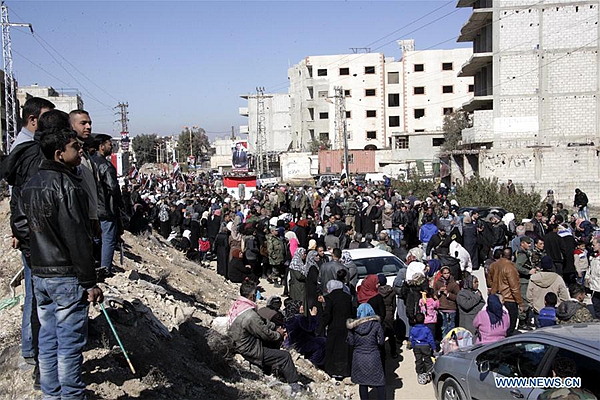China and the Middle East - a rapidly changing picture
- By Tim Collard
 0 Comment(s)
0 Comment(s) Print
Print E-mail China.org.cn, February 8, 2017
E-mail China.org.cn, February 8, 2017
|
|
|
Syrians gather at the entrance of al-Ziabiyeh town, southern countryside of Damascus, capital of Syria, on Feb. 6, 2017. (Xinhua/Ammar Safarjalani) |
China has for many years now preferred to refrain from involvement in the quagmire which is the Middle East. Until now the region has been considered too distant, and not sufficiently economically rewarding (apart from, of course, the need to ensure oil supplies) to justify closer engagement. What policy there has been has been entirely pragmatic, building on the establishment of sound economic and technological partnerships with Israel without disrupting relations with the diplomatically powerful Arab world.
So far, so good. But China's rise as a global economic power, fueled by the foundation of the AIIB and the launch of the Belt and Road initiative, has rendered it more difficult, not to say undesirable, for China to keep her distance from the politics and the region. And, in turn, Chinese interest in the region in the Belt and Road context is creating a new dynamic in the Middle East, with the potential of a major change to the balance of power in the region.
The technology and infrastructure finance which the full flowering of the Belt and Road initiative envisages would provide great opportunities for the economies of the region; in particular, adding diversity to a regional economy over-reliant on fossil fuel exports.
But there are two problems here: Firstly, the Belt and Road initiative is so wide-ranging that the future world will contain a diversity of potential trade routes. Secondly, that we are on the verge of a world in which the Middle East is no longer central to oil production and its ancillary industries. The worldwide development of larger and more diverse sources of gas, and of new energy-saving technologies, will ensure that that occurs within a very short period, and the region's significance in global affairs will necessarily decline with it.
Thus the Middle East, like any other political-economic entity, must learn to compete to enjoy the fruits of the coming Asian-dominated world order. And this means addressing its intractable security problems. Infrastructure, which will always be the central plank of international trade, must be kept secure. In the entire history of war, breaking the enemy's lines of communication and logistics has been a major strategic objective.
But, you will say, there is surely no need for talk of "enemies." The world is - largely - at peace: we have a functioning system in which agreements are made between sovereign states under the umbrella of established international law. This is true, but it cannot have escaped anybody's attention that the monopoly of force by sovereign states has been breached many times in the last decade, and that the epicenter of this phenomenon is in the Middle Eastern region, where there are several regions not under the control of any recognized government.
Further east, China has already addressed the security issue in Pakistan, in building the port at Gwadar, in western Pakistan on the Iranian border, as a major contribution to the Belt and Road program. But there China was able to rely on a strong and long-developed friendship with Pakistan, and is confident that under no circumstances will the Pakistani authorities allow threats to Sino-Pakistani joint projects.
The Middle East proper is a different matter. While keenly conscious that the phenomenon of Islamic terrorism, which has been demonstrably linked to Uighur separatist activists in Xinjiang, cannot be ignored, China remains keen to avoid any interference in the internal politics of any nation or in the balance of forces within the region as a whole. However, China must know that assurances of security from a national government can provide no real security for infrastructural projects, or for those working on them.
With one exception: Israel. China has been working, with practical mutual benefits, with Israel for thirty years. Both countries have been entirely pragmatic in this cooperation; neither has called on the other to adopt a particular political position, and both have given clear demonstrations of the ability to protect vital interests on their own soil. In an ideal world Israel would be well placed to act as the regional hub for the Belt and Road program. But here politics raises its ugly head again.
Clearly the basic requirement is a sustainable solution to the Israel-Palestine problem. Up to now China has stuck resolutely to the formula which became standard in the early 1990s: "land for peace." It made sense not to vary this formula while everything was in chaos: But no progress has been made on either land or peace, and even the possibility of such an exchange is beginning to fade. What effect the opportunities offered by China's infrastructural investment program will have on breaking the deadlock, we have yet to see.
And then there is the question of whether minds are flexible enough to ensure that these opportunities will be taken up. This essentially means that common sense will have to establish itself in areas where it has hitherto been in short supply. Can China help?
Tim Collard is a columnist with China.org.cn. For more information please visit:
http://www.shenbo75.com/opinion/timcollard.htm
Opinion articles reflect the views of their authors, not necessarily those of China.org.cn.




 Add your comments...
Add your comments...

